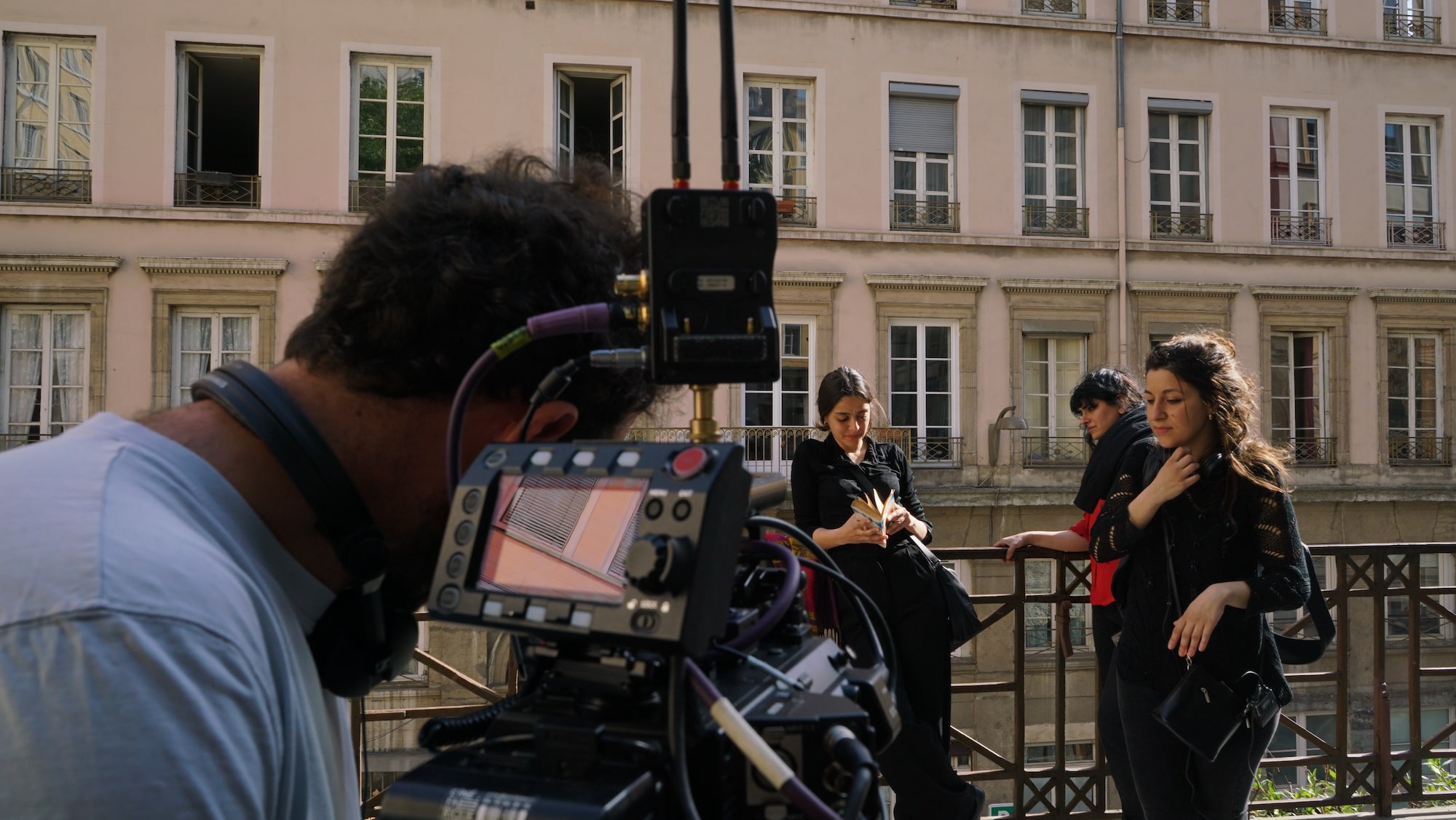
While it is presumptuous to assume our input has a direct effect on awards ceremonies, it’s always a pleasure when a film we select as one of our favourites of a festival ends up with the top prize. I put Les Chenilles in my top 10 films of the Berlinale 2023 due to its innovative mixture of essayistic tones, empathetic portrait of feminine solidarity and spontaneous, free-wheeling feel. Spinning a thread between the Silk Road between west and east and the modern migrant experience of women moving from a troubled Lebanon to modern-day Paris, it’s a smart, challenging film totally deserving of the Golden Bear for Best Short Film. It’s also, remarkably for a prize-winning film, the debut short fiction film from musicians and directors Michelle and Noel Kaserwany, who joined us to talk about living between Paris and Beirut, mixing essay with fiction forms and taking the Golden Bear back to Lebanon.
The film starts with a fact I had no idea about – the ideal temperature for silkworms is a woman’s breasts. Then it takes that thread and weaves this beautiful tale. Was this fact the starting point for your film?
The idea of the film came from two places: one is related to our own personal experiences and the other is related to historical facts triggered by an article by Fawwaz Traboulsi that explores the relationship between women from Mount Lebanon and foreign silk factories that were installed in the Levant region in the 19th century. In the context of breeding silkworms to create silk, a Japanese prince said around the year 462: “It’s in-between the breasts of women that cocoons should be placed to hatch”.
Going through an abrupt and unplanned migration was an intense experience full of events and encounters that are at the heart of this film.
The very idea that women in Mount Lebanon had to bear cocoons between their breasts to breed silkworms felt extremely disturbing. Inspired by this imagery and by the difficult conditions of women’s work in French silk factories in the 19th century in the Levant, and especially in Mount Lebanon, we created a modern story of displacement that goes back in time in order to tackle contemporary aspects of migration: work conditions, gender dynamics and the effect of historical events on our modern lives.
Besides, between 2019 and 2021, we both found ourselves leaving Lebanon to start a life torn between Paris and Beirut due to multiple pressures and crises that the country is going through. The core idea of the film came from there. Going through an abrupt and unplanned migration was an intense experience full of events and encounters that are at the heart of this film.
Did you have to do further research in order to find out more about gendered labour, colonialism, the Silk Road, and migration patterns?
Of course! We went through a lot of documents, archives, books and articles with the support of La Biennale de Lyon and many researchers and writers who helped us explore different dimensions of the story, and of ourselves, during the process. The archive that touched us the most was one that is related to a personal feeling or experience we lived.
Most of the time, the research process gives us answers to unidentified things that we have already been feeling for a long time. The effects of colonialism, gendered labor and migration are lived and felt through every detail in our daily lives and are not just concepts, research elements or “history”. So, we tried to weave together the historical and the personal to make the film reflect our contemporary conditions.

What makes this film so special to me is the way that it blends the personal essay, with the documentary, with drama, and a little bit more. Did you think about the film in terms of genre, or were you looking for a way to unpack genre and do something more personal? I found it fascinating.
We’re happy to know that the way the film was done touched you. In this film, as well as in our previous projects that were mostly political music videos, we don’t think about genre at all. We start by identifying what we are feeling as the most important part. We then reinforce our feelings with interviews, archive and research. It’s only after we solidify our point of view and intentions that we start working on the plot. Based on the way we start the work, it naturally takes a hybrid shape where everything is used in order to make the feeling we want to share go through, without being restrained by rules that can kill the soul and essence of our story.
Genre should be recalled to help writers expand their story, not chain them. Besides, we both didn’t learn anything related to film or storytelling in university or school or anything. We started creating videos and posting them online out of frustration, and slowly learnt writing, editing, and directing all while doing those videos in which we use music, documentary, stop motion, archive, Gifs, pixelated internet videos and whatever we feel like using — keeping in mind that form should serve the content and not the other way around.
Also, working with Konstantin Bock on the editing made mixing styles much easier; we understand each other very well and have worked together on our previous music videos as well.
Genre should be recalled to help writers expand their story, not chain them.

Lebanese people live all around the world, but there is a significant population in France and Paris. I loved the idea that the emigration from Lebanon to Paris is a continuation of that colonialist legacy. Is this something that you two feel personally living between Paris and Beirut today?
We have lived all our lives in Lebanon, rarely traveling for tourism when we could afford it. The downfall of Lebanon is what made us slowly find ourselves in France a few years ago. And today more than ever, history is repeating itself in a way. As a nation, we were unfortunately never able to organise ourselves in a way that assures our self-sufficiency on many levels, making it easier for foreign interventions (whether it’s France, Iran, USA, Saudi Arabia or other countries) to destabilise Lebanon on numerous levels and occasions.
This is happening again today, trying to live after one of the biggest non-nuclear explosions in the world blew Beirut up in 2020 caused by the same political system that is blocking the investigation in this case, during the worst economic crisis the country has ever witnessed, with banks confiscating the money of their depositors and the currency value’s worst drop in the history of the country erasing the middle class and raising the numbers of citizens living below the poverty line.
We once again are witnessing and taking part in a wave of migration and a wave of countries taking advantage of Lebanon’s situation trying to position their interests and sometimes their doctrines on us, like the Iranian Regime is trying to do right now. In the film, we highlight not only colonialism but the internal forces that fed the colonial system and were fed by it as well. And in our case today, it is the privileged class that is usually related or affiliated to the political system that is taking advantage of the crisis.
We live between the two countries now because it’s impossible for us to live in France without being able to be in Lebanon and the other way around as well! Living strictly in Lebanon is extremely difficult today. While being in France has its own challenges as well, it’s also a beautiful place to be in especially as artists. Having to be in two places simultaneously physically and mentally is what we also explore through our film as well.

Despite the use of essay form and voiceover, there are parts of the film, especially on the streets of Paris itself, that feel more spontaneous. Did you allow for some spontaneity to allow its way into the film?
All the film was shot in three and a half days by the brilliant cinematographer and friend Karim Ghorayeb (who also worked on our music videos). We did rely a lot on improvisation, but based on a solid story structure. Producer Marine Vaillant from Dewberries films had full trust in us and in our way of work, so everything was set to leave a margin of improvisation possible during the shoot.
A big part of the film was really following the actresses Noel and Masa on a long walk from dawn until night recording their real conversations. The trick was when Michelle met Masa Zaher, the Syrian actress, she started constructing the character of Asma around her (although there is a big difference between the real Masa and her character in the final result of the film). As for the character of Sarah, it was based on both our experiences moving from Beirut to Paris. Michelle then invited Noel to meet Masa and the two of them went for a walk together in Paris that day.
When they came back they spoke to Michelle about their conversations related to the different ways of doing shawarma in Syria and in Lebanon, or their mothers, or the fact that it’s difficult for foreigners to find apartments to rent in France. Michelle noted down key elements from their conversation and that first encounter was very similar to other encounters we both had while meeting women coming to France under various pressures coming from other Arab countries as well.
A big part of the film was really following the actresses Noel and Masa on a long walk from dawn until night recording their real conversations.
The three of us sat and took notes and thought of how to explore these conversations further and how to expend them in a way that could feed into the “walk along the Silk Road” sequence in the film. The conversation usually starts with food recipes, apartments, parents, then goes deeper into how our system affected us psychologically and mentally bringing out many other conversations related to fears and traumas. So, while walking the day of the shoot, Michelle started triggering the same conversations: choosing the lighter subjects during daylight, the more personal during sunset and the more intimate ones by the end of the day so that the mood of the image gets more intimate as the conversation proceeds.

The music also helps us to move between tones well, especially during the spider sequence. I’d love to know more about your collaboration with the composer.
Zeid Hamdan and Lynn Adib are also our friends. Zeid Hamdan is one of the pillars of the underground music scene in the Arab world. His work has inspired many generations. Lynn Adib is from Syria, her enchanting voice was a big inspiration for the film. Together they have a band called Bedouin Burger. Together they composed, arranged and orchestrated the original score of Les Chenilles. Their input was essential to the story given the fact that they also left their countries and live in France, making it very easy to get the core of the story.
We shared the early script with them both noting where we felt that music can interfere and the overall feel that was needed in those scenes. Lynn read the script and after a few discussions with us, she wrote, composed and performed the last track used in the film called Harir which means silk in Arabic. The lyrics are not translated from Arabic so that we keep the highlight on her beautiful voice and on the images, but people who understand Arabic will see the link between her lyrics and the story of the two women: the song speaks about a person being lost and finding comfort in another person’s arms and warmth, using silk as a metaphor.
Zeid took this track and used parts of her voice with new music that he composed from scratch to fit the scenes. As for the spider scene where Masa performs: when Michelle was writing the film, she asked Masa what she felt like expressing in the story as well, and she said that she would love to do a free physical performance. Michelle wrote the script with that in mind. We then asked Masa to provide reference music for her performance and organized a meeting between her and Zeid where they discussed the style. Zeid as usual, with his great talent, was able to create the perfect deconstructed musical piece that Masa felt comfortable with and that we used in the dramaturgy of the story in a very critical place.

There is an especially fine balance between the intellectualism at the onset and the genuine friendship we see by the end. What was it like achieving that?
The whole intellectual side of the film was not really just for the sake of documenting the facts indeed, but to instead reflect on our present feelings and life circumstances that are very much dependent on the genuine closeness we have with the people around us. That’s where the genuine friendship came from. Through this closeness between the two characters, we wanted to dive deeper into the importance of giving space to fragility in the heart of resisting difficult political situations. A balance that we see throughout the film in the relationship between the two characters.
Besides, finding a safe space where one can take a breath is a very important component of the balance one seeks when they leave their hometown and loved ones to start a new life in a new place. Through our personal experience we found this space through friendships that were essential to making this new place a bit more familiar. We wanted to reflect this in our film.
Throughout rehearsals and the whole work on the film, we bonded in real life and the actresses ended up becoming good friends. This definitely added another dimension to the film. Diving into our very real, deep emotions, even when some of them were a bit heavy to recall or to address, helped us push the whole work to a place that is the closest to our reality.
What’s it like working as co-directors, co-writers and also siblings? Does that connection kind of help you to find that emotional core of your stories?
We work so organically that it’s pretty difficult to answer such a question. We really feel complementary in the work we do despite the big differences we have in our characters. Reading the question, we do feel that our connection is what makes the emotional core of the stories and moral aspects of everything we do very clear and solid. We also are our worst critics, so our discussions help the work grow faster and better. We also have been doing this for almost ten years now, working together while also doing our independent projects.
Diving into our very real, deep emotions, even when some of them were a bit heavy to recall or to address, helped us push the whole work to a place that is the closest to our reality.





What was it like to win the Golden Bear for Best Short at the Berlinale?
It was the biggest surprise actually for us. Being accepted in the first place was a huge surprise because the film is 30 minutes and nonlinear. Let alone winning a Golden Bear… The first thing that we felt was the wave of happiness that this news created back home. As soon as we got the Golden Bear, the news spread very fast in Lebanon and in the region; minor good news in the middle of the multi-crisis that the country and region are going through currently. This made us very happy. We also were thrilled that the trust that was given to us by the powerful crew we had the chance to work with, and the producers Dewberries Films and La Biennale de Lyon, led to something fruitful.
Besides, on a personal scale, this is our first short film, and the first festival we have attended. Therefore, this first prize is a huge boost of energy for us to continue working on our ongoing film projects that are on the way. We also gave our Golden Bear a name and flew it with us back home where our mother is taking care of it now. It’s the first Golden Bear to enter Lebanon. We had to spoil it.
What are you working on next?
Together we are working on a feature political documentary called Slow Burn. We are also developing individual projects. Noel is currently writing her live action film Un An and developing an animated short film Seven Mountains and Seven Seas, a film on migration based on a story by Emily Nasrallah, grantee of the DFI Production Fund. Michelle has been researching and developing her first live action feature film Amara since 2021 with a grant from the CNC. The story happens entirely in Lebanon. She’s also working on her first animated feature film for adults Ouzkourini that has been supported by several writing and co-production programs. In parallel with all those projects, we will always keep on creating our political music videos that we have been doing for 10 years now.


